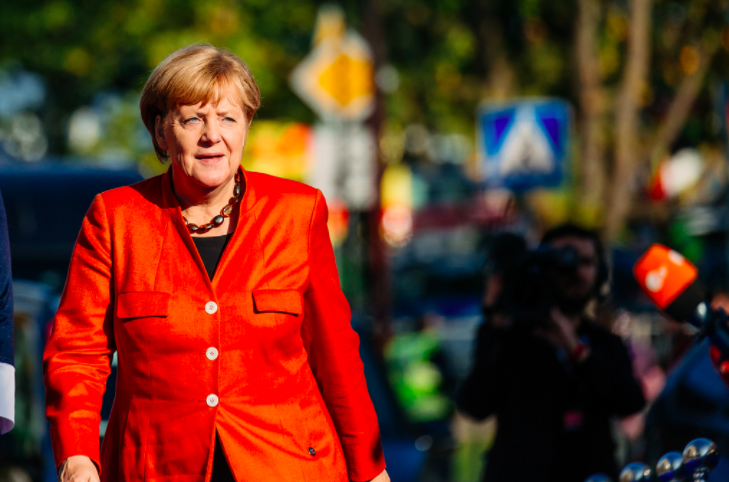The New German Coalition: A Government if You Can Keep It
After five months of uncertainty, the German Social Democratic Party (SPD) and Angela Merkel’s Christian Democratic Union and Christian Social Union (CDU/CSU) are going to give their uneasy marriage another try.

Published by The Lawfare Institute
in Cooperation With

After five months of uncertainty, the German Social Democratic Party (SPD) and Angela Merkel’s Christian Democratic Union and Christian Social Union (CDU/CSU) are going to give their uneasy marriage another try.
As I described on Lawfare in September, no one party received enough votes to form a government, so Merkel’s CDU/CSU, having received the highest proportion of votes, sought to form a coalition government. After nearly five months, on Feb. 7, the the CDU/CSU and the SDP decided to renew the “grand coalition” government (or GroKo), but the SPD insisted on holding a party-wide vote to approve the coalition before any government was established. On Mar. 4, SPD voters approved the coalition government, with 66 percent voting in favor—a result predicted by a Feb. 16 opinion poll, which recorded that two-thirds of SPD supporters would support the coalition. But despite these numbers, GroKo’s approval was not a foregone conclusion. Jusos, the youth wing of the SPD, campaigned against the coalition and recruited 20,000 new anti-GroKo members in anticipation of the vote.
The new government could be established and sworn in as early as Mar. 14. Once the GroKo is in place, the resulting cabinet will be split between the two parties. Particularly important to the future of the European financial picture, the finance ministry will be run by the SPD’s Olaf Scholz, changing hands from the CDU for the first time since 2009. The CDU will keep the defense ministry under Ursula von der Leyen, but the SPD will take the foreign ministry—although the matter of who precisely will serve as foreign minister remains unsettled. The coalition blueprint includes some notable foreign relations plans: in light of criticism of Merkel’s handling of the numbers of refugees admitted to Germany, refugee intake will be limited to an upper limit of 220,000 people per year. Separately, the government will cooperate with France on defense integration and potential cooperation on financial policy; the coalition plan advocates for European Monetary Fund reforms and higher contributions to the EU’s budget. With Emmanuel Macron’s proposals for an EU financial and defense overhaul and consolidation, it is important that Germany has a functioning government to negotiate the terms of any reform of European federalism.
The formation of the coalition government marks the beginning of Angela Merkel’s fourth term as chancellor (she has been operating as acting chancellor since the election in September) and another four years of relative political predictability for Germany. But it doesn’t mean that the country in the clear. The GroKo, and its fraught formation, may be part and parcel of the burgeoning problems that were of concern during the election itself.
First, this saga—Germany’s longest post-election period without a settled government—has both highlighted and exacerbated the perception of a “weakening” Germany. By some accounts, the five months of uncertainty and negotiation have made Germany look like less of a stable European leader than it normally projects. And the formation of the coalition does not erase the fact that the election results in September were the worst results for the CDU/CSU and the SPD since the Federal Republic was established in 1949. Moreover, the GroKo is Merkel’s second attempt to form a government; in November, she failed to build a coalition with the Free Democrats and the Greens before beginning talks with the SPD. The SPD had initially announced that it would take on the role of opposition party to any CDU/CSU coalition government, so its acquiescence seems like more of a compromise of necessity than a planned victory. The vote demonstrated that the party has not rejected the coalition despite at least one very public instance of hypocrisy: SPD party leader Martin Schulz, who had said that he would not serve a Merkel cabinet, later warmed to the idea of serving as foreign minister in the new GroKo but eventually said he would not serve under pressure from his party.
Despite Schulz’s personal embarrassment, the SPD’s control over the foreign ministry and the finance ministry is a coup that will cede significant power to the left-of-center party as the European financial picture continues to face uncertain times. Perhaps unsurprisingly, then, the fact that the SPD made the GroKo contingent on a party vote signalled an acknowledgment that the potential partnership with the CDU/CSU was unpopular and complicated enough to require broad validation before the party could sign on.
And not to be forgotten, the coalition government makes the far-right Alternative für Deutschland (AfD) the strongest opposition party in the Bundestag. Not only does that position validate the party’s radical right wing and anti-immigration positions, but it puts the AfD in the position to act as the leading foil to the coalition.
From an international security perspective, it will be important to keep an eye on the GroKo’s stance toward Russia. While the CDU/CSU and SPD coalition government is a new iteration of an old coalition, the SPD will remain in charge of the foreign ministry, and Germany’s current foreign minister, Sigmar Gabriel (SPD), has publicly articulated his desire for rapprochement with Russia. He has been open in his support of economic ties to Russia, especially the proposed Nord Stream 2 pipeline—which would be another offshore natural gas pipeline connecting Russia and Germany. But Gabriel is not the front-runner for foreign minister in the GroKo. On top of that, recent tensions between Gabriel and his party—he told one media source that he believes his work is underappreciated by the SPD—may marginalize his views on a Russian detente. As I mentioned in September, the SPD has historically been more open to dialogue with Russia. But Merkel was instrumental in implementing EU sanctions against Russia—and with EU equities as they are, there’s a good chance that Germany will remain the backbone of European opposition to Russia.
Moreover, newfound German stability is unfolding on the heels of a suspected Russian cyberattack against the German Federal Office for Information Security, reported on Feb. 28. One German news source and cybersecurity group, Palo Alto Networks, reported that the Foreign Ministry had also been targeted by the group known as FancyBear (remember them?) in this attack. Der Spiegel and Deutsch Presse-Agentur attributed the attack to “Snake,” another group with Russian affiliations. The Kremlin has denied the allegations—but, then again, it always does. Setting the truth of the attribution aside, the episode is likely another building block in the growing tension between Western democracies and Russia over the latter’s technological interference in the democratic infrastructure of the former.
All told, a stable Germany is a good thing for the EU—and for the United States too. With Brexit negotiations and an emboldened Russia, the German government sits (to some extent alongside France) at the heart of that portion of the EU that is still functioning. The September election and subsequent delay in government formation suggests that Germany is not as stable or unified as it was even a year ago, and the fracturing of German politics does not bode well for further EU consolidation or for some of the more economically and politically vulnerable entities in the union. But the GroKo buys time for the leading democratic forces in Europe’s leading democracy to regroup—keeping the extremes at the margins in the meantime.





